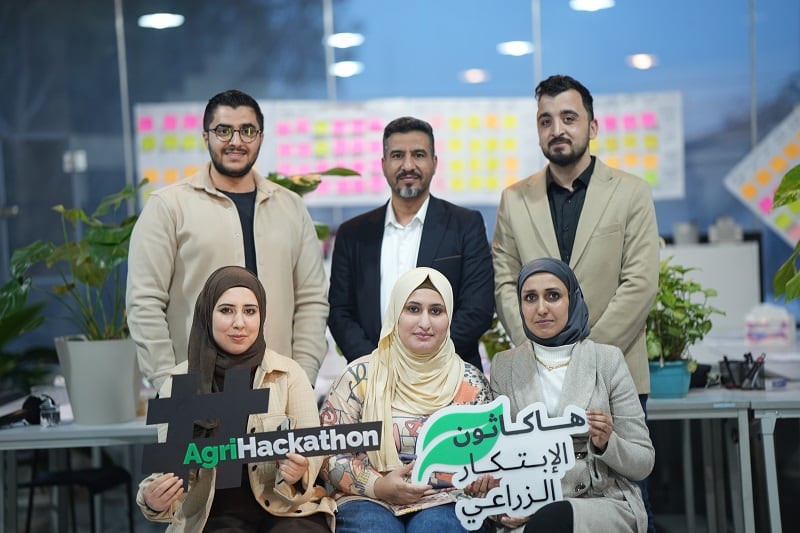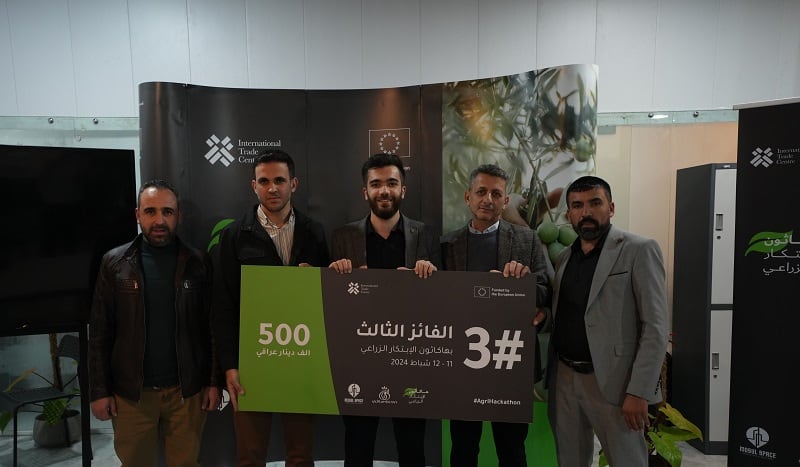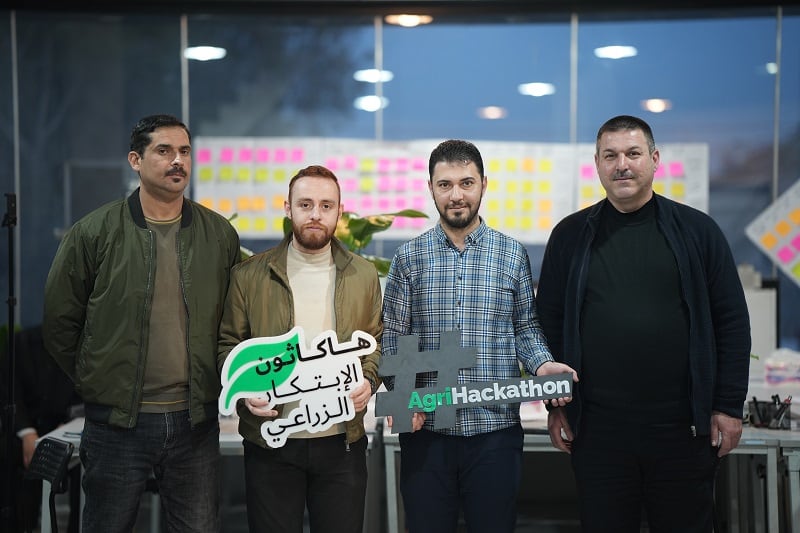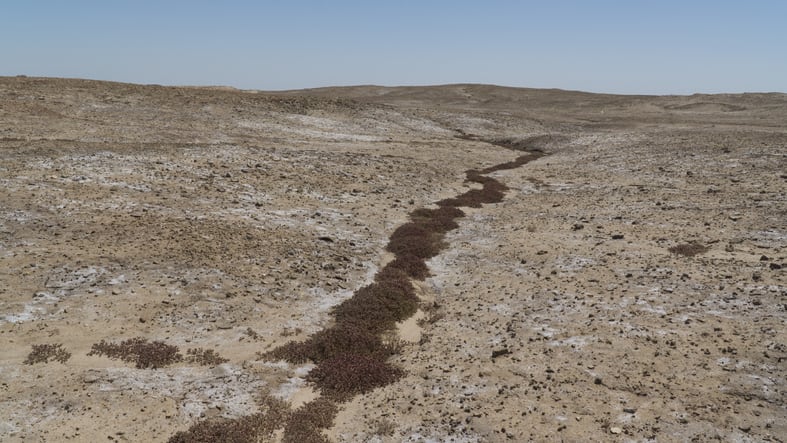Northern Iraq’s Nineveh region has long been known as an agricultural heartland, blessed with fertile lands and a rich agricultural history. But it faces a formidable challenge when water scarcity and agricultural issues combine to threaten the sustainability of its agriculture, explained Abdulla Thaier, communication specialist at Mosul Space, an innovation hub.
One of the main challenges is the decreasing water levels in the Tigris and Euphrates rivers, the major sources of irrigation for Iraq and Nineveh's farmlands.
Over the years, the two rivers basin has experienced high levels of water stress and environmental degradation, which has led to increased water scarcity.
With the impacts of climate change, drought is increasing in duration and intensity and desertification is growing, with more frequent sandstorms and flash floods, affecting agricultural yields.
According to the Iraqi Ministry of Water Resources (MoWR), water supply from both the Tigris and Euphrates rivers decreased by 50% in 2020, limiting the availability of water for irrigation purposes. As a result, farmers are left struggling to meet the water demands of their crops, negatively impacting their yields and livelihoods.
Another challenge stems from outdated and inefficient irrigation systems, said Thaier. Many farmers in Nineveh still rely on traditional flood irrigation methods that not only wastewater but also lead to soil salinity and waterlogging. These practices not only contribute to water scarcity but also compromise soil health and productivity, further exacerbating the challenges faced by farmers.
However, technological advancement has shaped significant development in many industries, and agriculture should be no exception.
Thus, the Agriculture Innovation Hackathon was born in recognition of the power of technology to overcome the challenges faced by farmers.
The event, which took place at Mosul Space’s offices on February 11-12, brought together farmers, entrepreneurs, and technologists to develop innovative solutions in the agricultural sector, and featured workshops and presentations on topics from technology and the food supply chain to water scarcity and soil health.
The hackathon had two main themes, explained Thaier, the agri-product value chain in Iraq, and water scarcity and management.
“We aimed to identify and support innovative tech-based solutions that could mitigate water scarcity or provide ideas and solutions,” he said, “for developing the value chain of agriproducts that contribute to the increase in smallholder farmers' income or reducing the market gap of overproduction in a specific time of the season in Nineveh.”
The event was organised by Mosul Space in collaboration with the International Trade Center, and funded by the European Union.
One notable solution unveiled at the event was a mobile application that utilised artificial intelligence and satellite imagery to monitor crop health and detect plant diseases. “This solution, if implemented, could help farmers take proactive measures to protect their crops and maximize yields,” said Thaier.
Another promising solution was an IoT-based irrigation system optimises water usage, reducing waste and combating water scarcity challenges.

Agriculture Innovation Hackathon chose three winning solutions. These will receive financial backing to support the ideas' growth and translate them into sustainable, scalable solutions.
Three solutions were selected from the event. One notable solution unveiled at the event was a mobile application that utilised artificial intelligence and satellite imagery to monitor crop health and detect plant diseases. “This solution, if implemented, could help farmers take proactive measures to protect their crops and maximize yields,” said Thaier.
Another promising solution was an IoT-based irrigation system optimises water usage, reducing waste and combating water scarcity challenges.
Agriculture Innovation Hackathon chose three winning solutions. These will receive financial backing to support the ideas' growth and translate them into sustainable, scalable solutions.
A promising solution for Nineveh's tomato industry
First is the Nabu project, which aims to transform excess crops of tomato into five innovative and valuable tomato-based products, creating new market opportunities and increasing income for both farmers.
By developing dried tomato slices, oil-preserved slices, and dried tomato powder, the project addresses the problem of surplus crops while providing convenient and flavorful ingredients for restaurants and home cooks alike. Additionally, a cooled dried tomato powder, which retains more nutrients and flavour, caters to health-conscious consumers.
The project would also extract lycopene, a powerful antioxidant, from tomatoes for use in dietary supplements and medical applications, tapping into the growing demand for natural health products. With the potential to increase farmer income, create jobs, boost the local economy, and reduce food waste.

A sustainable and eco-friendly solution for waste management
Next is the BSF project which utilises black soldier fly larvae to tackle two major issues in Nineveh: organic waste disposal and lack of organic fertiliser and animal feed.
“By feeding the larvae organic waste, the project recycles waste and produces valuable products,” explained Thaier. “The larvae themselves become a protein-rich feed for livestock, boosting their productivity and health. Additionally, the frass produced by the larvae is a potent organic fertilizer, enriching the soil and promoting healthy crop growth.”
This project offers a sustainable and eco-friendly solution for waste management, animal nutrition, and organic farming, contributing to a healthier environment and smarter farming practices in Nineveh, he said.

Embracing vertical aeroponics
Next is the Aero Plant project. Faced with water scarcity and unpredictable weather, Aero Plant rises to the challenge with a sustainable solution: vertical aeroponics.
This innovative method eliminates soil, slashing water use by 90% compared to traditional farming, while modern sensors and automation optimize growth conditions for year-round production of fresh, high-quality strawberries and other crops. Moreover, by controlling the entire farm-to-table process, Aero Plant ensures quality and freshness, delivering directly to consumers through a linked store and app, reducing transportation emissions, and offering convenience.
Locally grown produce competes effectively with imports, promoting self-sufficiency and economic sustainability, while a distinct brand identity fosters trust and customer loyalty. Aligned with Sustainable Development Goals, Aero Plant's experienced team implements efficient water-saving practices, paving the way for a more sustainable food system. “This project's potential is vast,” Thaier said,”promising increased food security, and economic opportunities, all while safeguarding precious water resources in arid lands.”




